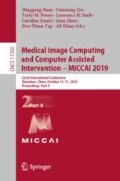Abstract
We propose to adapt segmentation networks with a constrained formulation, which embeds domain-invariant prior knowledge about the segmentation regions. Such knowledge may take the form of simple anatomical information, e.g., structure size or shape, estimated from source samples or known a priori. Our method imposes domain-invariant inequality constraints on a network output of unlabeled target samples. It implicitly matches prediction statistics between target and source domains with permitted uncertainty of prior knowledge. We address our constrained problem with a differentiable penalty, fully suited for conventional gradient descent approaches, removing the need for computationally expensive Lagrangian optimization with dual projections. Unlike current two-step adversarial training, our formulation is based on a single loss in a single network, which simplifies adaptation by avoiding extra adversarial steps, while improving convergence and quality of training. The comparison of our approach with state-of-the-art adversarial methods reveals substantially better performance on the challenging task of adapting spine segmentation across different MRI modalities. Our results also show a robustness to imprecision of size priors, approaching the accuracy of a fully supervised model trained directly in a target domain. Our method can be readily used for various constraints and segmentation problems.
Access this chapter
Tax calculation will be finalised at checkout
Purchases are for personal use only
Notes
- 1.
- 2.
In fact, region size is the 0-order shape moment; one can use higher-order shape moments for richer descriptions of shape.
- 3.
References
Berry, J.L., Moran, J.M., Berg, W.S., Steffee, A.D.: A morphometric study of human lumbar and selected thoracic vertebrae. Spine 12(4), 362–367 (1987)
Bertsekas, D.P.: Nonlinear Programming. Athena Scientific, Belmont (1995)
Chen, Y., Li, W., Van Gool, L.: Road: reality oriented adaptation for semantic segmentation of urban scenes. In: CVPR (2018)
Cheplygina, V., de Bruijne, M., Pluim, J.P.W.: Not-so-supervised: a survey of semi-supervised, multi-instance, and transfer learning in medical image analysis. MedIA 54, 280–296 (2019)
Gholami, A., et al.: A novel domain adaptation framework for medical image segmentation. In: Crimi, A., Bakas, S., Kuijf, H., Keyvan, F., Reyes, M., van Walsum, T. (eds.) BrainLes 2018. LNCS, vol. 11384, pp. 289–298. Springer, Cham (2019). https://doi.org/10.1007/978-3-030-11726-9_26
He, F.S., Liu, Y., Schwing, A.G., Peng, J.: Learning to play in a day: faster deep reinforcement learning by optimality tightening. In: ICLR (2017)
Hoffman, J., et al.: CYCADA: cycle-consistent adversarial domain adaptation. In: ICML (2018)
Hong, W., Wang, Z., Yang, M., Yuan, J.: Conditional generative adversarial network for structured domain adaptation. In: CVPR (2018)
Javanmardi, M., Tasdizen, T.: Domain adaptation for biomedical image segmentation using adversarial training. In: ISBI (2018)
Jia, Z., Huang, X., Chang, E.I., Xu, Y.: Constrained deep weak supervision for histopathology image segmentation. IEEE TMI 36(11), 2376–2388 (2017)
Kamnitsas, K., et al.: Unsupervised domain adaptation in brain lesion segmentation with adversarial networks. In: Niethammer, M., et al. (eds.) IPMI 2017. LNCS, vol. 10265, pp. 597–609. Springer, Cham (2017). https://doi.org/10.1007/978-3-319-59050-9_47
Kervadec, H., Dolz, J., Tang, M., Granger, E., Boykov, Y., Ayed, I.B.: Constrained-CNN losses for weakly supervised segmentation. MedIA 54, 88–99 (2019)
Klodt, M., Cremers, D.: segmentation with moment constraints. In: ICCV (2011)
Litjens, G., et al.: A survey on deep learning in medical image analysis. MedIA 42, 60–88 (2017)
Márquez-Neila, P., et al.: Imposing hard constraints on deep networks: promises and limitations. In: CVPR Workshop on Negative Results (2017)
Paszke, A., Chaurasia, A., Kim, S., Culurciello, E.: ENet: a deep neural network architecture for real-time semantic segmentation, arxiv preprint arXiv:1606.02147 (2016)
Pathak, D., Krähenbühl, P., Darrell, T.: Constrained convolutional neural networks for weakly supervised segmentation. In: ICCV (2015)
Ren, J., Hacihaliloglu, I., Singer, E.A., Foran, D.J., Qi, X.: Adversarial domain adaptation for classification of prostate histopathology whole-slide images. In: Frangi, A.F., Schnabel, J.A., Davatzikos, C., Alberola-López, C., Fichtinger, G. (eds.) MICCAI 2018. LNCS, vol. 11071, pp. 201–209. Springer, Cham (2018). https://doi.org/10.1007/978-3-030-00934-2_23
Shu, R., Bui, H.H., Narui, H., Ermon, S.: A DIRTT-T approach to unsupervised domain adaptation. In: ICLR (2018)
Tsai, Y., Hung, W., Schulter, S., Sohn, K., Yang, M., Chandraker, M.: Learning to adapt structured output space for semantic segmentation. In: CVPR (2018)
Tzeng, E., et al.: Adversarial discriminative domain adaptation. In: CVPR (2017)
Zhang, Y., David, P., Gong, B.: Curriculum domain adaptation for semantic segmentation of urban scenes. In: ICCV (2017)
Zhang, Y., Miao, S., Mansi, T., Liao, R.: Task driven generative modeling for unsupervised domain adaptation: application to X-ray image segmentation. In: Frangi, A.F., Schnabel, J.A., Davatzikos, C., Alberola-López, C., Fichtinger, G. (eds.) MICCAI 2018. LNCS, vol. 11071, pp. 599–607. Springer, Cham (2018). https://doi.org/10.1007/978-3-030-00934-2_67
Zhao, H., et al.: Supervised segmentation of un-annotated retinal fundus images by synthesis. IEEE TMI 38(1), 46–56 (2019)
Zou, Y., Yu, Z., Kumar, B.V.K.V., Wang, J.: Unsupervised domain adaptation for semantic segmentation via class-balanced self-training. In: ECCV (2018)
Author information
Authors and Affiliations
Corresponding author
Editor information
Editors and Affiliations
Rights and permissions
Copyright information
© 2019 Springer Nature Switzerland AG
About this paper
Cite this paper
Bateson, M., Kervadec, H., Dolz, J., Lombaert, H., Ayed, I.B. (2019). Constrained Domain Adaptation for Segmentation. In: Shen, D., et al. Medical Image Computing and Computer Assisted Intervention – MICCAI 2019. MICCAI 2019. Lecture Notes in Computer Science(), vol 11765. Springer, Cham. https://doi.org/10.1007/978-3-030-32245-8_37
Download citation
DOI: https://doi.org/10.1007/978-3-030-32245-8_37
Published:
Publisher Name: Springer, Cham
Print ISBN: 978-3-030-32244-1
Online ISBN: 978-3-030-32245-8
eBook Packages: Computer ScienceComputer Science (R0)


